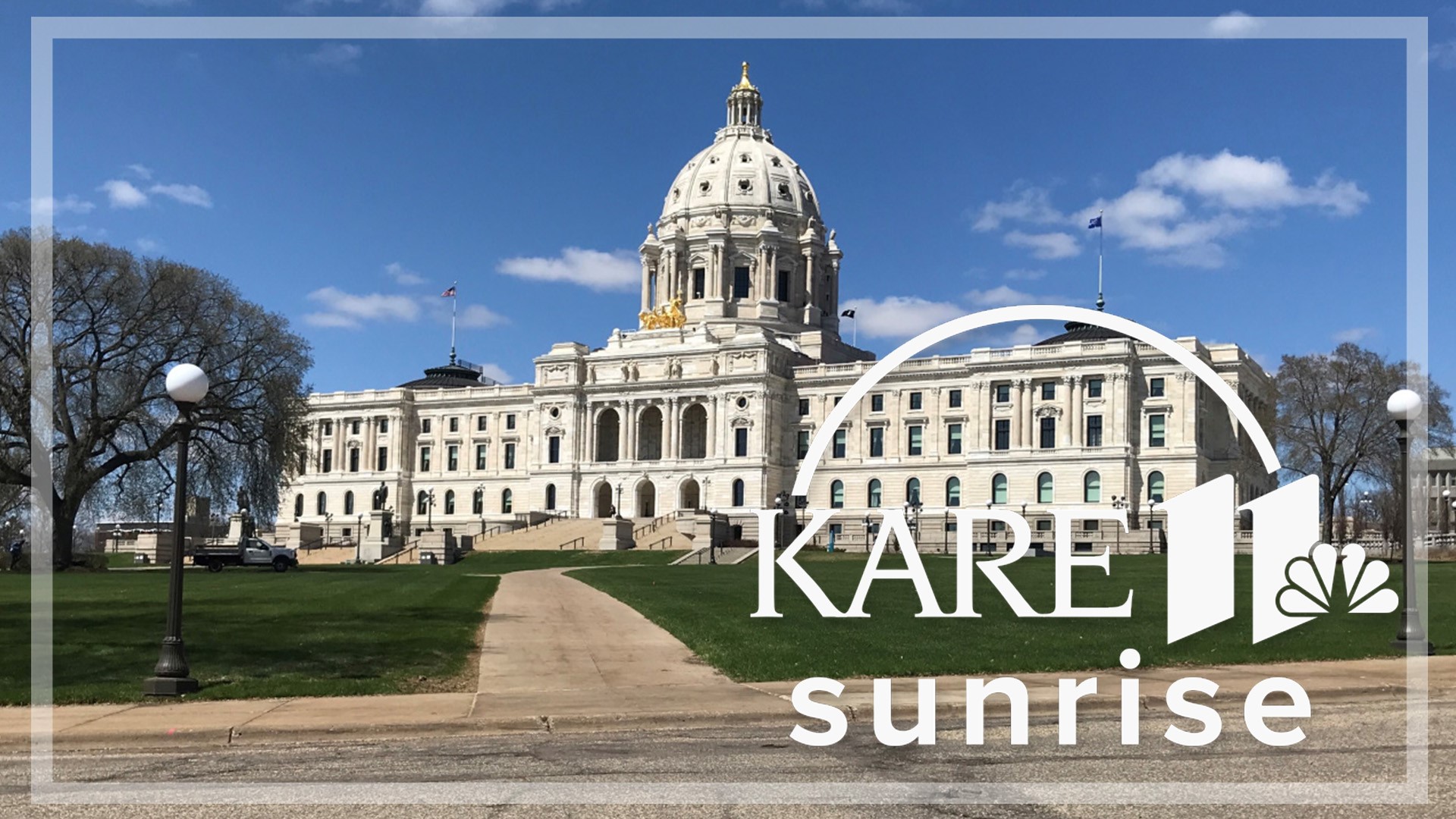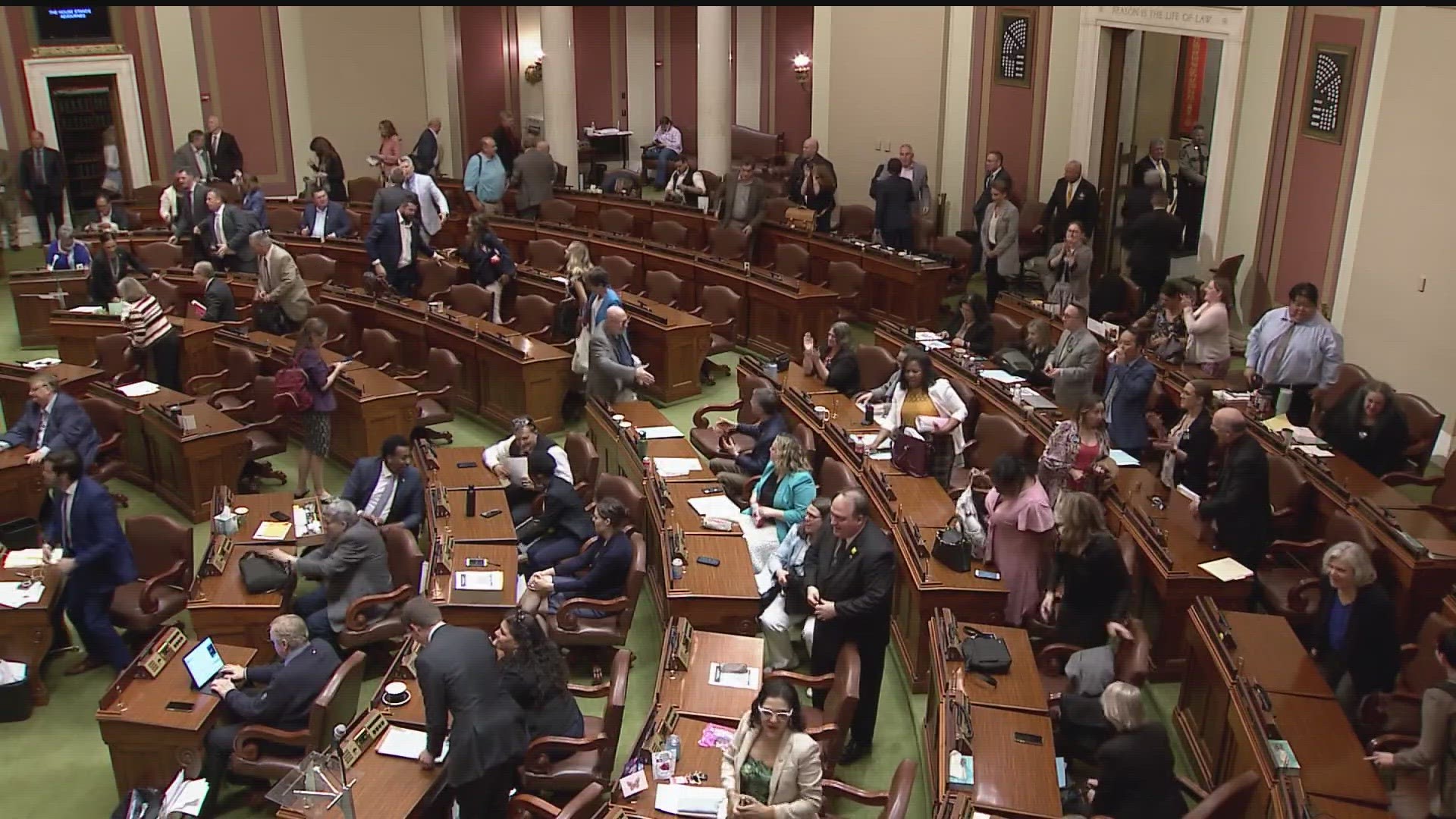ST PAUL, Minn. — The Minnesota Legislature put the final touches on a $72 billion state budget and adjourned for the year Monday night as Democrats celebrated enacting an ambitious agenda that ranged from protecting abortion rights, to providing more resources for education, to legalizing marijuana.
During the session, Democrats, who hold the majority in both the House and Senate, sent a flurry of bills to fellow-DFLer Gov. Tim Walz's desk for his signature.
The Republican minority, which was largely sidelined on most contentious issues this session, left upset, saying Democrats spent most of the surplus instead of returning it to taxpayers. And they decried Democrats for raising taxes by $2.2 billion over the next two years via the tax bill alone, and passing a two-year budget that's 40% bigger than the current budget.
Now that the Minnesota Legislature has adjourned until Feb. 12, 2024, here's a look at the major bills that passed in the legislature, what's been signed by Walz, and what lawmakers didn't get to this session. For a full list of bills sent to the governor for his signature this year, click here.
Legal recreational cannabis
What it does: The bill will legalize cannabis for use by adults and will automatically expunge low-level cannabis offenses for tens of thousands of Minnesotans. Retail sales wouldn't start in Minnesota until 2024, and local governments will control the location of the stores.
What's next: Gov. Walz has said he will sign the bill. Once signed, cannabis usage would become legal on Aug. 1, 2023. The state has already launched a website for the Minnesota Office of Cannabis Management.
Transportation bill
What it does: As the biggest transportation bill since 2008, the package passed on Sunday includes $650 million to leverage $7.8 billion in federal dollars set aside for qualified projects in the state. The bill would for the first time index the state gas tax to inflation in highway costs starting in Jan. 2024 and imposes a three-quarter cent sales tax increase in the seven-county Twin Cities metro area dedicated to transit and roads.
The bill also includes a 50-cent retail delivery fee on orders over $100. All food, whether grocery items or dishes made in restaurants, would be exempt from the new fee.
What's next: The bill will head to Gov. Walz's desk for a signature.
Uber/Lyft bill
What it does: The bill would increase protections for drivers against being fired or "deactivated," and increase minimum compensation to at least $1.45 per mile and $0.34 per minute in the Twin Cities metro area and at least $1.25 per mile for trips that start outside the metro. There is also a minimum fee of $5.00 for any transportation of a rider by a driver.
What's next: Uber and Lyft told KARE 11 they are urging Governor Tim Walz to veto the bill, who has not yet committed to signing it.
Tax bill and rebate checks
What it does: The $3 billion package creates a new child tax credit of up to $1,750 per child for households making $35,000 a year and gradually phasing out on incomes up to $96,250, and expands the K-12 Education Credit to $1,500 per child. Also included are one-time rebate checks of $260 for single filers making up to $75,000 and $520 for couples making up to $150,000. Taxpayers could receive an additional $260 check for up to three children.
What's next: The bill passed in the House and Senate and will head to Gov. Walz.
Public safety and gun control
What it does: The public safety measure established universal background checks and red flag laws in Minnesota and funds Minnesota's court system, state prisons, BCA crime labs, civil legal aid, and community violence prevention efforts.
The bill also requires all private gun transactions to be subject to the same background checks that happen when someone buys a gun from a licensed firearm dealer and requires those who want to sell a firearm to someone outside their immediate family to go to a gun dealer or local law enforcement to get a background check on the buyer.
What's next: Gov. Tim Walz signed the bill into law on Friday, May 19 alongside Congresswoman Gabby Giffords and Allina Buffalo Clinic shooting survivor Melissa Kennedy. Universal background checks go into effect Aug. 1 and red flag laws go into effect on Jan. 1. 2024.
Bills protecting access to abortion, protecting gender-affirming care and banning conversion therapy
What it does: The three bills prohibit mental health practitioners or professionals from providing conversion therapy to vulnerable adults and those under 18, prevent state courts or officials from complying with child removal requests, extraditions, arrests, or subpoenas related to gender-affirming health care that a person receives in Minnesota, and ensures that patients traveling to Minnesota for abortion care, and the providers who serve them, are protected from legal attacks and criminal penalties from other states.
What's next: Gov. Walz signed the trio of bills on Thursday, April 27, all of which went into effect on that day.
Prince Rogers Nelson Highway Act
What it does: The bill renames a stretch of Highway 7 in Chanhassen and Eden Praire as Prince Rogers Nelson Memorial Highway, in honor of the late singer and Grammy winner Prince, who lived and recorded music at Chanhassen's Paisley Park.
What's next: Purple signs denoting the highway will be installed this summer.
Lead pipe replacement
What it does: The bill provides $240 million to the Public Facilities Authority to establish a grant program for replacing water service lines containing lead around the state.
What's next: Walz signed the bill on May 16, which went into effect that day.
Free school meals for all students
What it does: The state bill funds, after the application of all available federal funds, to provide free school breakfast and free school lunch to Minnesota students in all participating schools, regardless of family income
What's next: Gov. Tim Walz signed the bill on March 17, which goes into effect on July 1, 2023.
Bill expands voting rights
What it does: The bill provides that anyone convicted of a felony who has served and completed incarceration will have their voting privileges restored and requires officials with the Department of Corrections or judiciary system to provide written notice and a voter registration application to individuals upon their release from confinement.
What's next: The law is effective July 1, 2023, and applies to the right to vote at elections conducted on or after that date.
Driver's License for All
What it does: The bill expands eligibility for a standard Minnesota driver’s license by allowing Minnesotans, regardless of immigration status, to obtain a license.
What's next: Gov. Walz signed the bill into law on March 7 and the law is effective Oct. 1, 2023.
Crown Act
What it does: The Creating a Respectful and Open World for Natural Hair or CROWN Act adds "a definition of race to the Minnesota Human Rights Act to explicitly protect natural hairstyles and textures, including but not limited to braids, locks, and twists."
What's next: Gov. Walz signed the CROWN Act on Jan. 31, 2023.
Health Finance Bill
What it does: The bill will boost spending on health programs by more than $3.5 billion. It boosts funding for child care providers, and expands childcare assistance making it easier to qualify for aid. The bill also keeps low-income children covered for health care longer without the need for the families to keep re-applying for that benefit.
One of the controversial parts of the bill is that it makes undocumented immigrants eligible for Minnesota Care, the subsidized health insurance plan for working low-income families.
The bill has passed the Senate and House.
What's next: Gov. Walz must sign the bill to make it a law in Minnesota.
Infrastructure Bonding Bill
What it does: This bill will deliver an additional $300 million to nursing homes over the next four years, along with $18 million allocated for payments to nursing facilities, future partial reimbursement to hospitals for qualifying avoidable patient days, and a workforce incentive grant program.
On Monday, lawmakers announced they'd reached a decision on the controversial Keeping Nurses at the Bedside Act — renamed the Nurse and Patient Safety Act — saying they were confident the provision will pass before the end of this year's session.
The bill passed both the House and Senate.
What's next: The bill now heads to Gov. Walz for his signature.
What's left?
An anti-discrimination amendment that would put a Constitutional question on the ballot about adding language to the Minnesota Constitution guaranteeing rights regardless of race, color, creed, sex, sexual orientation, gender identity or expression, age, disability, ancestry or national origin.
Earlier this month, House and Senate leaders admitted there wouldn't be time left in the session to reach a deal on sports betting legislation.
Watch more Minnesota politics:
Watch the latest political coverage from the Land of 10,000 Lakes in our YouTube playlist:
WATCH MORE ON KARE 11+
Download the free KARE 11+ app for Roku, Fire TV, Apple TV and other smart TV platforms to watch more from KARE 11 anytime! The KARE 11+ app includes live streams of all of KARE 11's newscasts. You'll also find on-demand replays of newscasts; the latest from KARE 11 Investigates, Breaking the News and the Land of 10,000 Stories; exclusive programs like Verify and HeartThreads; and Minnesota sports talk from our partners at Locked On Minnesota.
- Add KARE 11+ on Roku here or by searching for KARE 11 in the Roku Channel Store.
- Add KARE 11+ on Fire TV here or by searching for KARE 11 in the Amazon App Store.
- Learn more about the KARE 11+ app for Apple TV in the Apple App Store.
- Learn more about KARE 11+ here.


